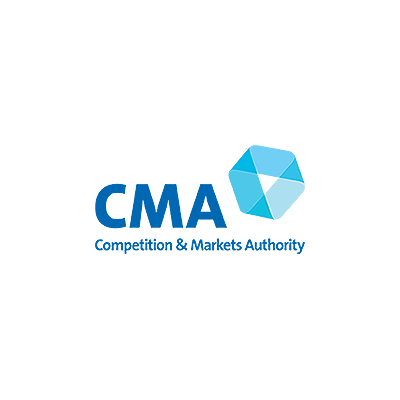Description
The Competition and Markets Authority (CMA) is the competition regulator in United Kingdom. It is a non-ministerial government department in the United Kingdom, responsible for strengthening business competition and preventing and reducing anti-competitive activities. The CMA launched in shadow form on 1 October 2013 and began operating fully on 1 April 2014, when it assumed many of the functions of the previously existing Competition Commission and Office of Fair Trading, which were abolished.
Formation
On 15 March 2012 the UK Government's Department for Business, Innovation and Skills (BIS) announced proposals for strengthening competition in the UK by merging the Office of Fair Trading and the Competition Commission to create a new single Competition and Markets Authority (CMA). The formation of the CMA was enacted in Part 3 of the Enterprise and Regulatory Reform Act 2013, which received royal assent on 25 April 2013.
In July 2012, Lord Currie was appointed chairman designate of the CMA and in January 2013 Alex Chisholm was appointed Chief Executive designate. The term 'designate' was dropped when the CMA was launched on 1 October 2013.
On 15 July 2013 BIS announced the first stage of an open public consultation period and published a summary, setting out the background to the consultation and inviting views on the draft guidance for the CMA. The first stage of the consultation ended on 6 September 2013. On 17 September, BIS announced the second stage of the consultation, which closed on 7 November 2013.
During 2013 and 2014, the CMA announced several waves of appointments at director level, reporting to members of the senior executive team.
On 28 March 2014 the CMA published the Rules of Procedure for CMA merger, market and special reference groups following a consultation which ran from 21 February to 18 March.
On 26 July 2017, Andrea Coscelli was appointed chief executive officer of the Competition and Markets Authority.
On 20 June 2018, Andrew Tyrie took up his role as the new Chair of the CMA, taking over from Lord Currie.
On 12 August 2019, the CMA's London office moved to The Cabot, 25 Cabot Square, in London's Canary Wharf area.
Responsibilities
In situations where competition could be unfair or consumer choice may be affected, the CMA is responsible for:
- investigating phase 1 and phase 2 mergers
- conducting market studies and market investigations
- investigating possible breaches of prohibitions against anti-competitive agreements under the Competition Act 1998
- bringing criminal proceedings against individuals who commit cartels offences
- enforcing consumer protection legislation, particularly the Unfair Terms in Consumer Contract Directive and Regulations
- encouraging regulators to use their competition powers
- considering regulatory references and appeals
- Regulation of public sector subsidies to business
- Oversight of the UK Internal Market
Strategic Goals
The CMA currently lists 5 strategic goals:
- delivering effective enforcement – to deter wrongdoing, protect consumers and educate businesses
- extending competition frontiers – by using the markets regime to improve the way competition works, in particular within the regulated sectors
- refocusing consumer protection – working with its partners to promote compliance and understanding of the law, and empowering consumers to make informed choices
- achieving professional excellence – by managing every case efficiently, transparently and fairly, and ensuring all legal, economic and financial analysis is conducted to the highest international standards
- developing integrated performance – through ensuring that all staff are brought together from different professional backgrounds to form effective multi-disciplinary teams and provide a trusted competition adviser across government
Office for the UK Internal Market
Following the United Kingdom's exit from the European Union (EU) approximately 170 areas previously regulated by the EU would now be regulated by the Devolved Administrations and UK government respectively. The UK government concerned about the impact of divergence on the UK Internal Market (UKIM) introduced the UK Internal Market Act. The Office was established within the CMA on 21 September 2021. Its role is similar to that of the EU commission in overseeing the EU internal market, the OIM's functions includes;
- Regularly reporting of the state of the UK internal market
- Providing advice to UK Government and the devolved administrations on the impact regulations may have on the UKIM
- Taking reports from the public and businesses on regulations that are disruptive to the internal market
- Launching investigations into regulations or other policies that might be disrupting the internal market and offering solutions.
Subsidy control regulator
In line with UK commitments in the UK-EU Trade and Cooperation Agreement the UK government designated the CMA as its subsidy control regulator. Whilst in the EU this had been referred to State Aid and was regulated by the EU Commission. However, unlike the EU the CMA will have no power to prohibit a Government department, Devolved Administration, Local Authority or other public sector body to provide support.
Controversy
In December 2019, the Commission released a report recommending the curtailment of the duopoly of Google and Facebook. The general election meant that the report was not presented to the Government in December; in particular, this prevented the carrying of ideas, such as the sharing of 90% of online data provided to the company with other companies, to fruition.
The UK Competition Commission ruled several times against MyFerryLink, an English passenger and ferry freight company, preventing its operations from Dover despite the French competition authority authorising cross-channel activity. The French government blamed the decision to ban one out of three ferry operators on fair-trade concerns. The appeals court overturned these rulings, as MyFerryLink was not a merger of the bankrupt SeaFrance and Eurotunnel, the latter of which remains responsible for the management of the Channel Tunnel. MyFerryLink called attention to a potential conflict of interest, pointing out that the former accountant of DFDS, the competitor and plaintiff of the case, was now a member of the UK Competition Commission. Following these delays, Eurotunnel, owner of the boats rented to MyFerryLink, sold two new boats to the aforementioned competitor. Due to this, the port of Calais was blocked by workers, boats were occupied and the Channel Tunnel attacked, resulting in cross-channel disruption and traffic jams in the UK and France.
The UK Competition Commission ruled against the merger between Illumina and Pacific Biosciences in 2019. Some experts in the field of DNA sequencing considered that this would be bad news for Pacific Biosciences, although others considered the CMA's decision to be within their remit. The US Federal Trade Commission argued along the same lines as the CMA's decision later in 2019.
Healthcare
During an inquiry into the private healthcare market, the authority made the Private Healthcare Market Investigation Order in 2014. This requires healthcare providers, including NHS trusts, to submit information to the Private Healthcare Information Network. This will include information about infection rates, rates of adverse incidents and the relative health improvement brought about by treatments. This will be broken down by consultants in 2018 and, in 2019, will extend to charges.
























